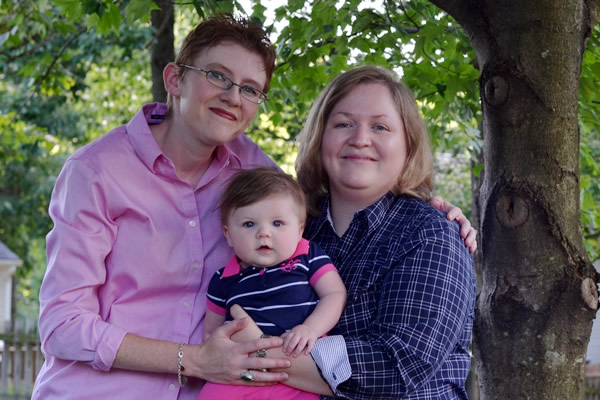a&e features
Double delights
Lesbian moms celebrate motherhood together
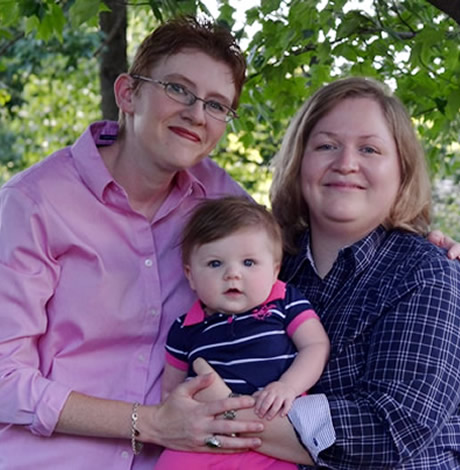
Mother’s Day brings double blessings for lesbian parents. But in most of the country, there’s a downside — couples in many states are fighting for the legal protections only available to some same-sex U.S. couples. We asked several couples involved in marriage equality lawsuits — three in Virginia and one in Pennsylvania — what they’ll be doing on Sunday and why the day is special to them.
NAME: Victoria L. Kidd
PARTNER’S NAME: Christy J. Berghoff
OCCUPATION: Writer
KIDS’ NAME(S) AND AGES: Lydia Berghoff-Kidd, 1
CITY/STATE: Winchester, VA
CASE INVOLVED IN: Harris Et Al. V. Rainer et al. (Formerly Harris et al. V. McDonnell et al.)
As a lesbian mom, what does Mother’s Day mean to you? Does it have any special significance as an LGBT parent?
I suspect much of what I feel on Mother’s Day is similar to that felt by mothers in opposite-sex relationships or by single mothers. I feel the same humble gratitude for being fortunate enough to be a mother to my daughter. I feel the same sense of thankfulness that my little one is here to share my life with me and to give my life a purpose greater than any other.
The one uniqueness about being a mother involved in a same-sex relationship is that it is a life experience shared with someone you love completely, your wife. In that sense, Mother’s Day takes on a special significance, because the day marks that shared experience and allows you to demonstrate your love and commitment to another person who is equally mother to your child.
What is your Mother’s Day tradition? Do you and your partner celebrate it together?
Our family is still working to define our traditions, as our daughter is just a little over a year old. Certainly, we both endeavor to show our own mothers that we appreciate them, but as far as celebrating in our home, we more or less simply spend the day together. We share a special meal and have hours of “play time” as a family. For us, celebrating this particular day is not about what you do, it is about sharing time together. Christy and I do exchange cards filled with messages of support, because parenting is not easy. We both simply try to find the words and the ways available to say we love each other, support each other and would not want to share life or the responsibilities of motherhood with anyone else.
You’re a plaintiff in a state marriage case — in your own words, please tell us why you feel it’s important for gay families to have legal protections.
Our family is built upon love and commitment. Christy and I committed to being each other’s “forever” when we were married in 2011 in D.C., but life is delicate and uncertain. Should anything happen to either of us, we want to ensure the other is afforded the same protections and benefits granted to legally married opposite-sex couples. More importantly, we want our daughter to be fully protected. Protections extend beyond benefits allowed after death; they provide the foundation for greater everyday acceptance in our communities. When people are separated out as somehow different at an institutional level, it makes it easier for others to perceive them, and subsequently to treat them, differently. Gaining protections under law advances the idea that our families should be treated equally and without bias while going about our day-to-day lives.
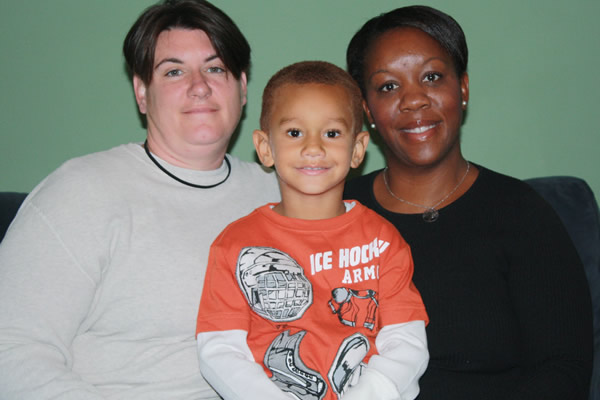
Joanne Harris and Jessica Duff with Jabari. (Photo courtesy of the couple)
NAME: Joanne Harris
PARTNER’S NAME: Jessica Duff
OCCUPATION: Director of diversity and advocacy
KIDS’ NAME(S) AND AGES: Jabari, age 5
CITY/STATE: Staunton, VA
CASE INVOLVED IN: Harris et al vs. Janet Rainey
As a lesbian mom, what does Mother’s Day mean to you? Does it have any special significance as an LGBT parent?
Being a mother has been the most rewarding and important experience of our lives, and being Jabari’s mothers makes every day feel like Mother’s Day. Although we celebrate this day together with our own mothers, we also take this opportunity to remind our friends and family members being acknowledged as Jabari’s legal parent is one of many reasons why marriage equality is important in Virginia.
What is your Mother’s Day tradition? Do you and your partner celebrate it together?
We celebrate Mother’s Day with our extended family. It’s a special day for us to celebrate the most influential women in our family, not just our mothers, but all of those who have supported us.
Yes we celebrate every family tradition together.
You’re a plaintiff in a state marriage case — in your own words, please tell us why you feel it’s important for gay families to have legal protections.
We feel it’s important for all families to be treated equally. Every devoted partner and loving parent should have the opportunity to provide all the legal intricacies of functioning as a family. This sometimes may include authorizing medical treatment, academic guidance and full financial support. These things are only a few of the things not possible without full legal marriage rights. We want the same rights as other loving couples and parents in our beautiful extended family and network of friends.
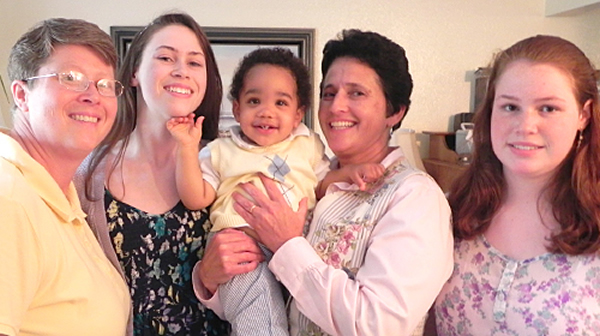
The Whitewood family (Photo courtesy of the family)
NAME: Deb Whitewood
PARTNER’S NAME: Susan Whitewood
OCCUPATION: Full-time Mom
KIDS’ NAME(S) AND AGES: Abbey, 17; Katie, 15; Landon, 3.
CITY/STATE: Bridgeville, PA
CASE INVOLVED IN: Whitewood v. Wolfe
As a lesbian mom, what does Mother’s Day mean to you? Does it have any special significance as an LGBT parent?
To me, Mother’s Day means the same that I think it means to any mom, to have our children, families, friends and community members recognize the mothers, or mother figures, in our lives for the hardworking and loving presence that they faithfully provide to not only their own children, but often to other children in their communities. Being a mother was once described to me as akin to having your heart walk around outside of your body. That’s what I feel, I feel like I have at least three or four or more pieces of my heart walking around the world with me.
As a lesbian couple, becoming mothers wasn’t easy for Susan and me. We had to work very hard to create our family and we had to jump through a lot of hoops, legally, emotionally and physically. But the result is that we have three wonderful kids who call us Mummy and Momma, and they know, without a shadow of a doubt, just how much they were wanted and how precious each of them is to us.
What is your Mother’s Day tradition? Do you and your partner celebrate together?
I have to laugh, because until this Mother’s Day, Susan and I have always been together on Mother’s Day. The kids would make cards, often really, really large, creative cards, for us. We would go to church together and then head out to celebrate with our own mothers and my grandmas, often with a brunch together in downtown Pittsburgh. Things have changed though. Susan’s mom and both of my grandmas have passed away. And in true mother form, our kids’ activities take precedence over even our Mother’s Day celebration. Our daughter, Katie, has a volleyball tournament in Columbus, Ohio on Mother’s Day. (Whomever planned that should have their head examined!) So off to Columbus we will go. My mom will be joining us later in the afternoon. So we will make our own Mother’s Day celebration wherever we end up. That’s the thing about moms; we go with the flow and do whatever is necessary to make it work out best for all members of the family.
You’re a plaintiff in a state marriage case — in your own words, please tell us why you feel it’s important for gay families to have legal protections.
Gay and lesbian families are in communities all around us and many are raising children. We live and work alongside our straight married friends and do things almost exactly the same way. We change diapers, help with homework, clean the house, car pool, shop for prom dresses, cheer at volleyball games, visit the zoo, shop at the grocery, see the doctor and play at the park just like our straight counterparts do. In many of our communities we are viewed as equal to our straight counterparts and our families are valued and supported. But even when our families are valued and supported, there is disparity. Our families are treated like second-class families in so many ways. Children are denied health insurance because their parents are not allowed to be married and the employer won’t provide insurance for the same-sex spouse and her children. Gay and lesbian parents have to pay large legal fees to create a patchwork of legal protections to give their families some, but nowhere near all, the protections that come with marriage. We file for second-parent adoptions and hope they will be granted. We notarize wills, powers of attorney, guardianship papers and other paperwork and pray that we will never need them, but we carry them everywhere, just in case. No married, straight friend of mine has ever had to scramble to find her power of attorney paperwork when she heard her husband had been rushed to the hospital. I have. I made sure I had it when Susan went to the hospital last year because all I could think was, “What am I going to do if they won’t let me see her?”
Our families deserve the same recognition and protection that other families have because we ARE a family. A family that loves each other, supports each other, cares for each other and will always be there for each other.
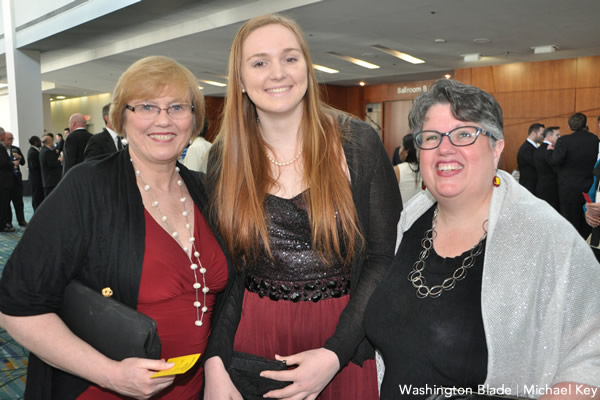
From left, Mary Townley, Emily Townley-Schall and Carol Schall attended the 2014 Equality Virginia Commonwealth Dinner on April 5. (Washington Blade photo by Michael Key)
NAME: Carol Schall
PARTNER’S NAME: Mary Townley
OCCUPATION: Assistant professor and researcher, Virginia Commonwealth University
KIDS’ NAME(S) AND AGES: Emily, age 16
CITY/STATE: Richmond, VA
CASE INVOLVED IN: Bostic v Rainey
As a lesbian mom, what does Mother’s Day mean to you? Does it have any special significance as an LGBT parent?
It is a celebration of our job as moms. It is a day to recognize the wonder and joy of being a mom. It is also a recognition that being a mom is not intuitive, easy or second nature. It requires mindfulness and awareness of your role to raise the next generation and even the generations to come. According to experts, we parent as our parents do. Emily will probably parent her children as we have parented her. So, Mother’s Day is a day for me to reflect on the generations past and the generations yet to come that will carry our light forward into the ages. Beyond all other endeavors, being a mom is the most important and lasting. Being a mom has been a dream of mine from the time I could first think. For Mary and I, we didn’t think this could be a reality until we set a vision to become moms. I love being Emily’s mom more than any other job I have ever had. It is my greatest joy and my greatest worry all at the same time!
What is your Mother’s Day tradition? Do you and your partner celebrate it together?
Emily usually shops for gifts for us with a good friend of ours the week before Mother’s Day. Our morning is usually pretty easy. As a teen, she likes to sleep late, that means her moms get to sleep late too! Once we are up and moving, we usually go out to Sunday brunch. We also try to have all chores done to make it a really relaxed family day. When Emily was a baby, we would shop for each other. Now that she is older, she shops for us. I love to recognize the amazing mom that Mary is. She is warm and kind and tenderhearted when it comes to Emily. Mother’s Day is my opportunity to recognize all that she is and means to Emily.
You’re a plaintiff in a state marriage case — in your own words, please tell us why you feel it’s important for gay families to have legal protections.
Mary gave birth to Emily, but I am the main “bread winner” in our family. Without marriage, the state of Virginia will never recognize me as Emily’s parent. Marriage matters for Emily and all of our children. Without the protections of marriage, Virginia would not recognize my estate as Emily’s should anything ever happen to me. They would not automatically notify me if anything ever happened to her. Finally, they could even prohibit me from seeing her or coming to her aid if anything were to happen to Mary. Without marriage, I am a legal stranger to my own daughter. I am in this fight for Emily. I want her to have a family that is recognized. I want to be able to legally and finally be her mom. We celebrate Mother’s Day as a family. I long for the day when we can legally celebrate Mother’s Day as a nation.
a&e features
Queer highlights of the 2026 Critics Choice Awards: Aunt Gladys, that ‘Heated Rivalry’ shoutout and more
Amy Madigan’s win in the supporting actress category puts her in serious contention to win the Oscar for ‘Weapons’
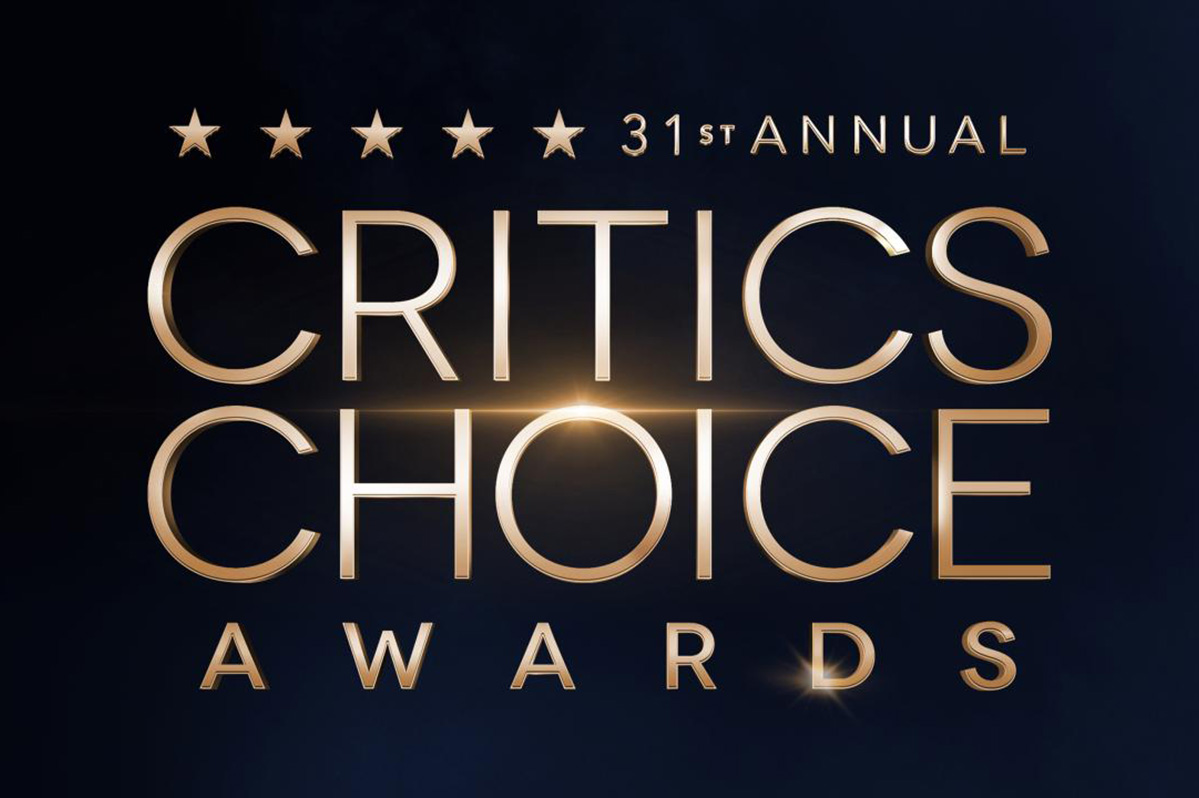
From Chelsea Handler shouting out Heated Rivalry in her opening monologue to Amy Madigan proving that horror performances can (and should) be taken seriously, the Critics Choice Awards provided plenty of iconic moments for queer movie fans to celebrate on the long road to Oscar night.
Handler kicked off the ceremony by recapping the biggest moments in pop culture last year, from Wicked: For Good to Sinners. She also made room to joke about the surprise hit TV sensation on everyone’s minds: “Shoutout to Heated Rivalry. Everyone loves it! Gay men love it, women love it, straight men who say they aren’t gay but work out at Equinox love it!”
The back-to-back wins for Jacob Elordi in Frankenstein and Amy Madigan in Weapons are notable, given the horror bias that awards voters typically have. Aunt Gladys instantly became a pop culture phenomenon within the LGBTQ+ community when Zach Cregger’s hit horror comedy released in August, but the thought that Madigan could be a serious awards contender for such a fun, out-there performance seemed improbable to most months ago. Now, considering the sheer amount of critics’ attention she’s received over the past month, there’s no denying she’s in the running for the Oscar.
“I really wasn’t expecting all of this because I thought people would like the movie, and I thought people would dig Gladys, but you love Gladys! I mean, it’s crazy,” Madigan said during her acceptance speech. “I get [sent] makeup tutorials and paintings. I even got one weird thing about how she’s a sex icon also, which I didn’t go too deep into that one.”
Over on the TV side, Rhea Seehorn won in the incredibly competitive best actress in a drama series category for her acclaimed performance as Carol in Pluribus, beating out the likes of Emmy winner Britt Lower for Severance, Carrie Coon for The White Lotus, and Bella Ramsey for The Last of Us. Pluribus, which was created by Breaking Bad’s showrunner Vince Gilligan, has been celebrated by audiences for its rich exploration of queer trauma and conversion therapy.
Jean Smart was Hack’s only win of the night, as Hannah Einbinder couldn’t repeat her Emmy victory in the supporting actress in a comedy series category against Janelle James, who nabbed a trophy for Abbott Elementary. Hacks lost the best comedy series award to The Studio, as it did at the Emmys in September. And in the limited series category, Erin Doherty repeated her Emmy success in supporting actress, joining in yet another Adolescence awards sweep.
As Oscar fans speculate on what these Critics Choice wins mean for future ceremonies, we have next week’s Golden Globes ceremony to look forward to on Jan. 11.
a&e features
Looking back at the 10 biggest A&E stories of 2025
‘Wicked,’ Lady Gaga’s new era, ‘Sexy’ Bailey and more
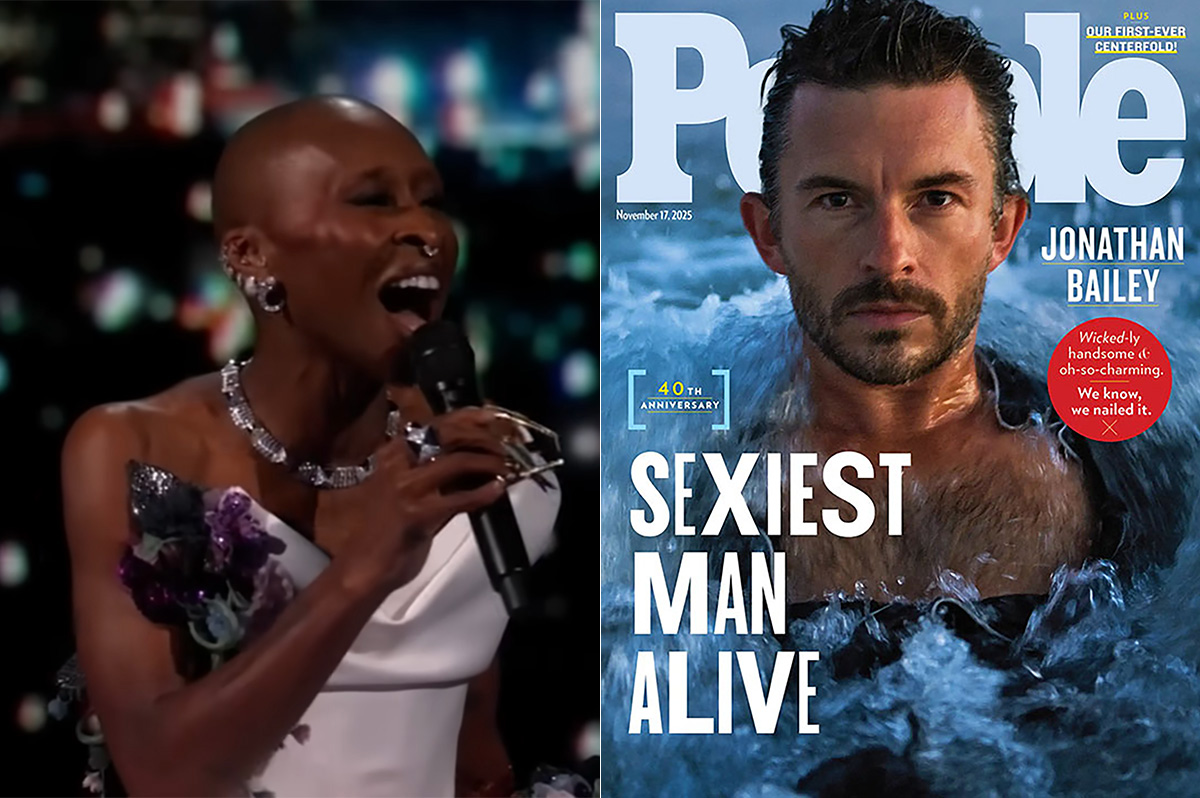
Although 2025 was a year marked by countless attacks on trans rights and political setbacks, the year also saw brilliant queer artists continuing to create art. From Cannes and Sundance Award winners now vying for Oscar consideration to pop icons entering new stages of their careers, queer people persevered to tell their stories through different media.
With the state of the world so uncertain, perhaps there’s no more vital time to celebrate our wins, as seen through some of this year’s top pop culture moments. While there’s no collection of 10 stories that fully encompass “the most important” news, here are some events that got the gays going:
10. ‘Mysterious Gaze of the Flamingo’ wins big at Cannes
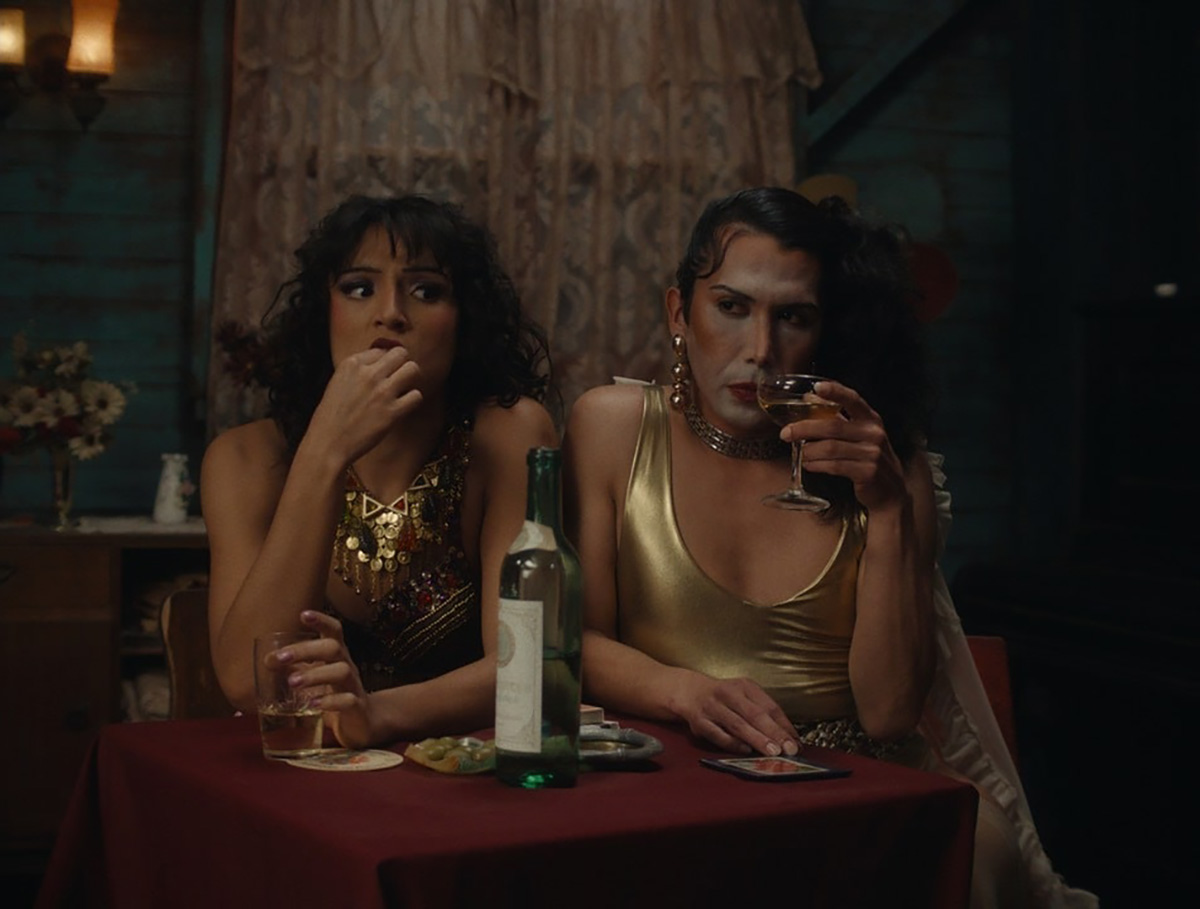
The Cannes Film Festival has become a crucial start for films hoping to make their way to the Oscars, and first-time director Diego Céspedes won the top Un Certain Regard prize for his intimate western “The Mysterious Gaze of the Flamingo.” The film is set in the ‘80s and is intended as an allegory for the AIDS epidemic. Seeing a film that unpacks vital queer history win one of the most coveted awards at Cannes has been a huge point of pride in the independent filmmaking community.
Since the film bowed at Cannes, it has been selected as Chile’s Oscar entry in the Best International Feature race. Speaking with The Blade during the film’s AFI Fest run in October, Céspedes said: At first, I was kind of scared to have this campaign position in the times that we’re living [in] here. But at the same time, I think the Oscars mean a huge platform — a huge platform for art and politics.”
9. ‘The Last of Us’ returns for an even gayer season 2
While the first season of The Last of Us gave us one of TV’s most heartbreaking queer love stories in the episode “Long, Long Time,” Season 2 doubled down on its commitment to queer storytelling with the blossoming relationship between Ellie (Bella Ramsey) and Dina (Isabela Merced). The show expanded on the pair’s relationship in the original video game, making it perhaps the central dynamic to the entire season. That unfortunately came with more homophobic backlash on the internet, but those who checked out all the episodes saw a tender relationship form amid the show’s post-apocalyptic, often violent backdrop. For their performance, Ramsey was once again nominated for an Emmy, but Merced deserved just as much awards attention.
8. ‘Emilia Pérez’ sparks controversy
Jacques Audiard’s genre-bending trans musical “Emilia Pérez” proved to be an awards season juggernaut this time last year, winning the Golden Globe for Best Musical/Comedy. But when the lead star Karla Sofia Gascón’s racist, sexist, and homophobic old tweets resurfaced, the film’s Oscar campaign became a tough sell, especially after Netflix had tried so hard to sell Emilia Pérez as the “progressive” film to vote for. Mind you, the film had already received significant backlash from LGBTQ+ audiences and the Mexican community for its stereotypical and reductive portrayals, but the Gascón controversy made what was originally just social media backlash impossible to ignore. The only person who seemed to come out of the whole debacle unscathed was Zoe Saldaña, who won the Oscar for Best Supporting Actress over Ariana Grande.
7. ‘Sorry, Baby’ establishes Eva Victor as major talent
Back in January at the Sundance Film Festival, Eva Victor (known by many for her brand of sketch comedy) premiered their directorial debut “Sorry, Baby” to rave reviews, even winning the Waldo Salt Screening Award. Victor shadowed Jane Schoenbrun on the set of “I Saw the TV Glow,” and seeing Victor come into their own and establish such a strong voice immediately made them one of independent cinema’s most exciting new voices. A memorable scene in the film sees the main character, Agnes (played by Victor), struggling to check a box for male or female, just one example of how naturally queerness is woven into the fabric of the story.
Most recently, Victor was nominated for a Golden Globe for her performance in the film, and she’s represented in a category alongside Jennifer Lawrence (“Die My Love”), Jessie Buckley (“Hamnet”), Julia Roberts (“After the Hunt”), Renate Reinsve (“Sentimental Value”) and Tessa Thompson (“Hedda”). The film also received four Independent Spirit Award nominations overall.
6. Paul Reubens comes out in posthumous doc
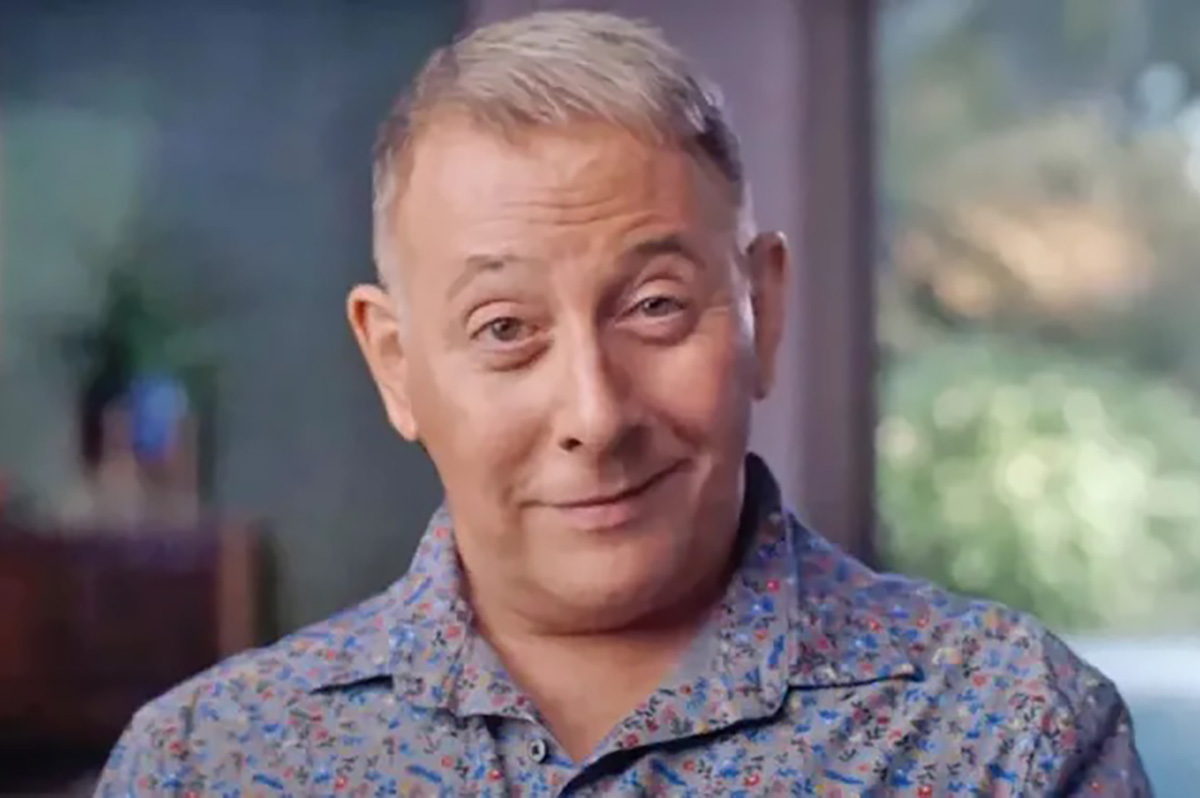
While Paul Reubens never publicly came out as gay before passing away in 2023, the two-part documentary “Pee-wee as Himself” premiered back in May on HBO Max, giving the legendary comedian a chance to posthumously open up to the world. Directed by Matt Wolf, the documentary explores how Reubens found his alter ego Pee-Wee Herman and why he kept his private life private.
The documentary won an Emmy in the Outstanding Documentary or Nonfiction Special category and remains one of the most critically acclaimed titles of the year with a 100% Rotten Tomatoes score. Also worth noting, the National Geographic documentary Sally told the posthumous coming out story of Sally Ride through the help of her long-time partner, Tam O’Shaughnessy.
5. Lady Gaga releases ‘Mayhem’
Lady Gaga entered a new phase of her musical career with the release of Mayhem, her seventh album to date. From the frenzy-inducing pop hit Abracadabra to the memorable Bruno Mars duet featured on “Die With a Smile,” seeing Gaga return to her roots and make an album for the most die-hard of fans was especially rewarding after the underwhelming film releases of “House of Gucci” and “Joker: Folie à Deux.” Gaga has been touring with The Mayhem Ball since July, her first arena tour since 2018. She even extended her tour into 2026 with more North American dates, so the party isn’t stopping anytime soon. And Gaga is even set to make an appearance next May in “The Devil Wears Prada 2.”
4. Cynthia Erivo, Ariana Grande perform at the Oscars
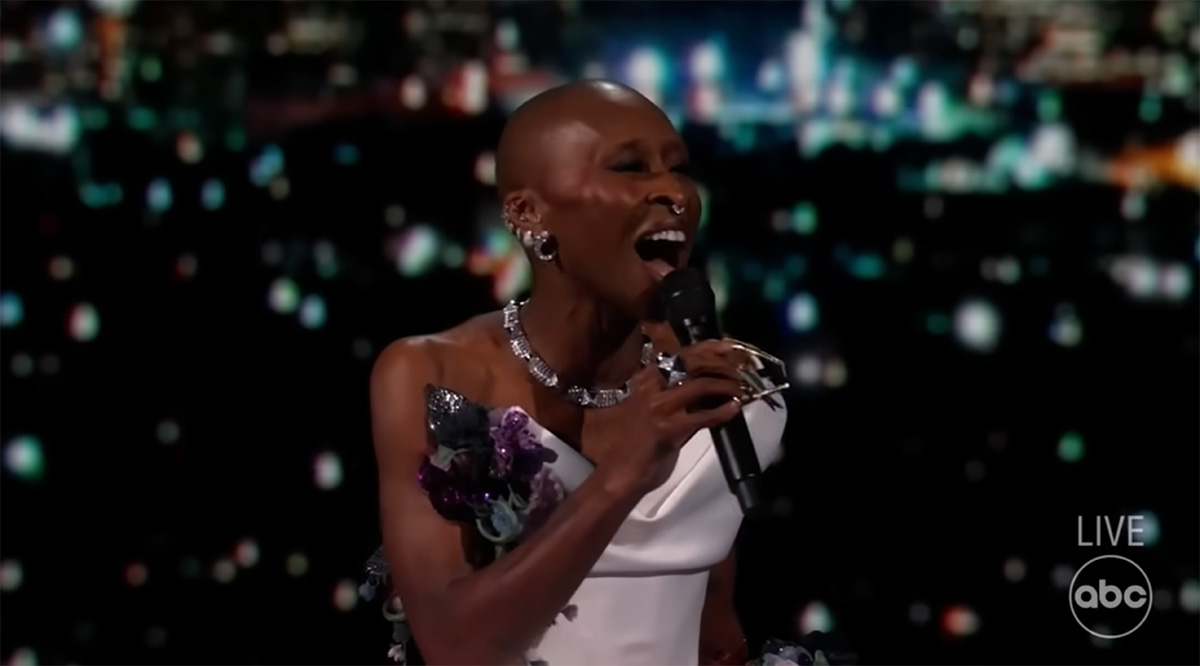
While “Wicked: For Good” didn’t quite reach the heights of the first film, we will forever have Cynthia Erivo and Ariana Grande’s breathtaking live performance that opened the 97th Academy Awards. The pair sang a rendition of “Over the Rainbow,” “Home,” and “Defying Gravity,” paying proper homage to the original 1939 “Wizard of Oz.” Even non-Wicked fans can’t deny how magical and brilliantly staged this performance was. With both Erivo and Grande up for acting Oscars last year, they’re hoping to repeat success and make history with consecutive nominations. Either way, let’s hope there’s another live performance in the making, especially with two new original songs (The Girl in the Bubble and No Place Like Home) in the mix.
3. Indya Moore speaks out against Ryan Murphy
Indya Moore has consistently used social media as a platform for activism, and in September, posted a 30-minute Instagram live speaking out against “Pose” co-creator Ryan Murphy. Moore claimed that Murphy wasn’t being a true activist for trans people. “Ryan Murphy, we need you to do more. You need to address the racism, the violence, and the targeting of people on your productions, Ryan Murphy. You do need to make sure trans people are paid equally. Yes, Janet did the right thing,” Moore said. Murphy was also back in the headlines this year for the critically panned “All’s Fair” and the controversial “Monster: The Ed Gein Story” starring Laurie Metcalf and Charlie Hunnam.
2. Cole Escola wins Tony for Best Leading Actor
Few pop culture moments this year brought us together more than Cole Escola winning a Tony award for “Oh, Mary!” the Broadway show they created, wrote and starred in (we love a triple threat!) Escola made history by becoming the first nonbinary person to win a Tony in the leading actor category, and seeing them excitedly rush to the stage wearing a Bernadette Peters-inspired gown instantly became a viral social media moment.
The cherry on top of Escola’s major moment is the recent news that they are writing a Miss Piggy movie with Jennifer Lawrence and Emma Stone producing — news that also broke the internet for the better. We cannot wait!
1. Jonathan Bailey makes gay history as ‘Sexiest Man Alive’
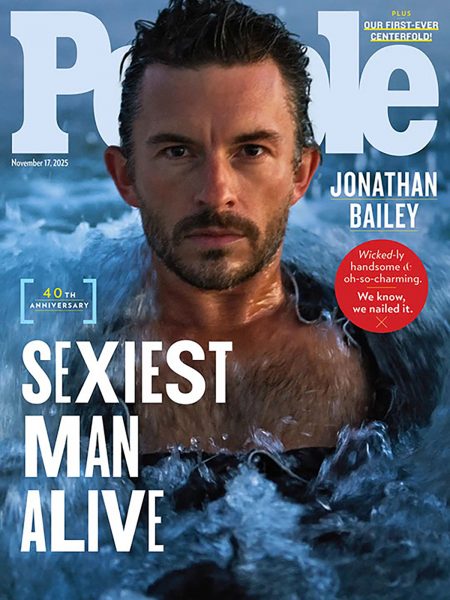
The same year as his on-screen roles in blockbusters “Jurassic World Rebirth” and “Wicked: For Good,” Jonathan Bailey made history as the first openly gay man to be named People magazine’s “Sexiest Man Alive.” The fact that it took 40 years for an openly gay man to earn the title is a signifier of how far we still have to go with queer representation, and seeing Bailey celebrated is just one small step in the right direction.
“There’s so many people that want to do brilliant stuff who feel like they can’t,” he told PEOPLE, “and I know the LGBT sector is under immense threat at the moment. So it’s been amazing to meet people who have the expertise and see potential that I could have only dreamed of.” In 2024, Bailey founded the charity titled The Shameless Fund, which raises money for LGBTQ+ organizations.
a&e features
Your guide to D.C.’s queer New Year’s Eve parties
Ring in 2026 with drag, leather, Champagne, and more
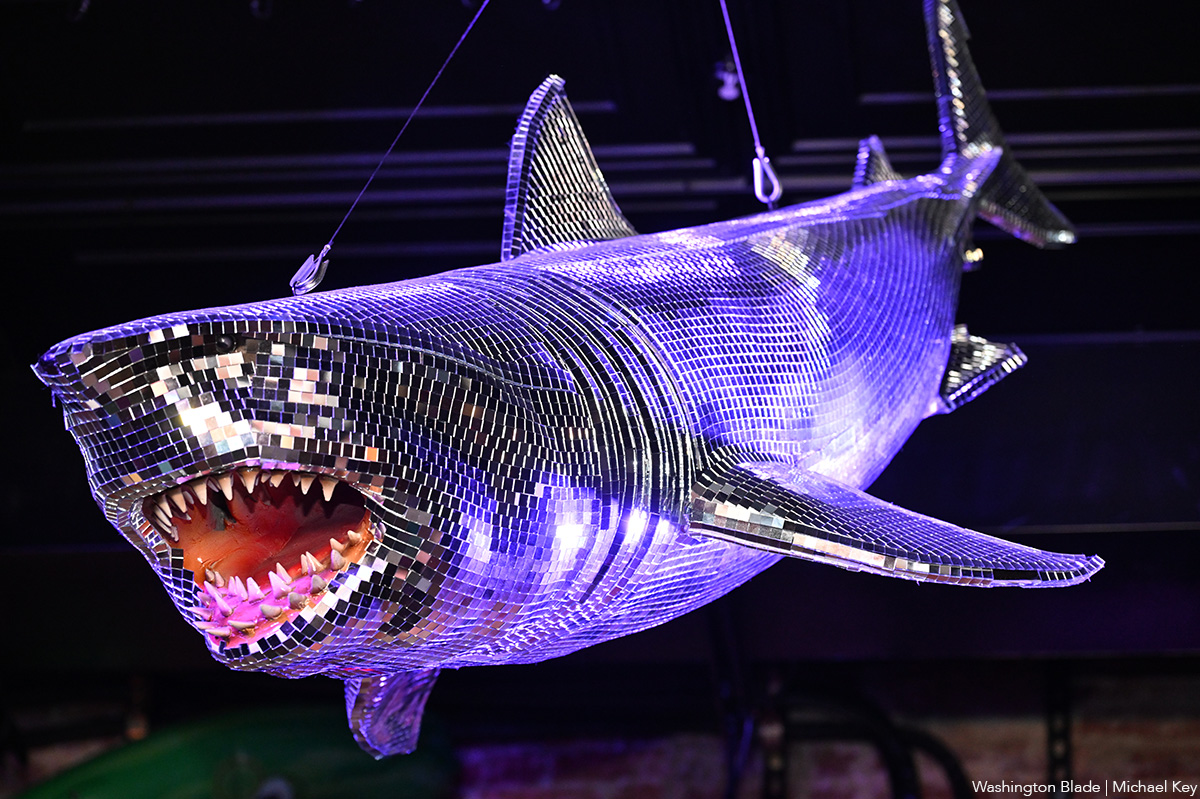
With Christmas in the rear view mirror, we can turn our attention to ringing in a much-anticipated New Year with a slew of local LGBTQ parties. Here’s what’s on tap.
Pitchers
This spacious Adams Morgan bar is hosting the “Pitchers’ Perfect New Year’s Eve.” There will be a midnight Champagne toast, the ball drop on the big screens, and no cover, all night long. The bar doesn’t close until 4 a.m., and the kitchen will be open late (though not until close). All five floors will be open for the party, and party favors are promised.
Trade
D.C.’s hottest bar/club combo is leaning into the Shark motif with its NYE party, “Feeding Frenzy.” The party is a “glitterati-infused Naughty-cal New Year’s Even in the Shark Tank, where the boats are churning and the sharks are circling.” Trade also boasts no cover charge, with doors opening at 5 p.m. and the aforementioned Shark Tank opening at 9 p.m.. Four DJs will be spread across the two spaces; midnight hostess is played by Vagenesis and the two sea sirens sensuously calling are Anathema and Justin Williams.
Number Nine
While Trade will have two DJs as part of one party, Number Nine will host two separate parties, one on each floor. The first floor is classic Number Nine, a more casual-style event with the countdown on TVs and a Champagne midnight toast. There will be no cover and doors open at 5 p.m. Upstairs will be hosted by Capital Sapphics for its second annual NYE gathering. Tickets (about $50) include a midnight Champagne toast, curated drink menu, sapphic DJ set by Rijak, and tarot readings by Yooji.
Crush
Crush will kick off NYE with a free drag bingo at 8 p.m. for the early birds. Post-bingo, there will be a cover for the rest of the evening, featuring two DJs. The cover ($20 limited pre-sale that includes line skip until 11 p.m.; $25 at the door after 9 p.m.) includes one free N/A or Crush, a Champagne toast, and party favors (“the legal kind”). More details on Eventbrite.
Bunker
This subterranean lair is hosting a NYE party entitled “Frosted & Fur: Aspen After Dark New Year’s Eve Celebration.” Arriety from Rupaul Season 15 is set to host, with International DJ Alex Lo. Doors open at 9 p.m. and close at 3 p.m.; there is a midnight Champagne toast. Cover is $25, plus an optional $99 all-you-can-drink package.
District Eagle
This leather-focused bar is hosting “Bulge” for its NYE party. Each District Eagle floor will have its own music and vibe. Doors run from 7 p.m.-3 a.m. and cover is $15. There will be a Champagne toast at midnight, as well as drink specials during the event.
Kiki, Shakiki
Kiki and its new sister bar program Shakiki (in the old Shakers space) will have the same type of party on New Year’s Eve. Both bars open their doors at 5 p.m. and stay open until closing time. Both will offer a Champagne toast at midnight. At Kiki, DJ Vodkatrina will play; at Shakiki, it’ll be DJ Alex Love. Kiki keeps the party going on New Year’s Day, opening at 2 p.m., to celebrate Kiki’s fourth anniversary. There will be a drag show at 6 p.m. and an early 2000s dance party 4-8 p.m.
Spark
This bar and its new menu of alcoholic and twin N/A drinks will host a NYE party with music by DJ Emerald Fox. Given this menu, there will be a complimentary toast at midnight, guests can choose either sparkling wine with or without alcohol. No cover, but Spark is also offering optional wristbands at the door for $35 open bar 11 p.m.-1 a.m. (mid-shelf liquor & all NA drinks).
-

 Colombia5 days ago
Colombia5 days agoGay Venezuelan man who fled to Colombia uncertain about homeland’s future
-

 Arts & Entertainment5 days ago
Arts & Entertainment5 days ago2026 Most Eligible LGBTQ Singles nominations
-

 District of Columbia4 days ago
District of Columbia4 days agoKennedy Center renaming triggers backlash
-

 District of Columbia4 days ago
District of Columbia4 days agoNew interim D.C. police chief played lead role in security for WorldPride

